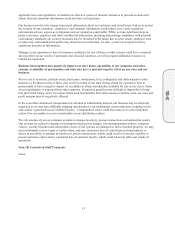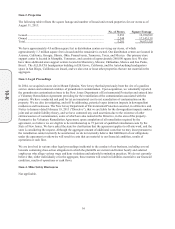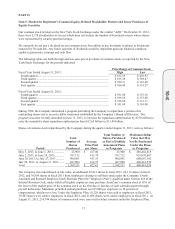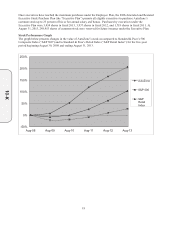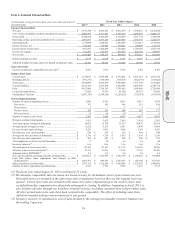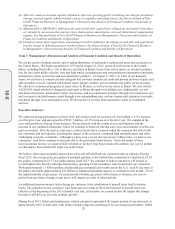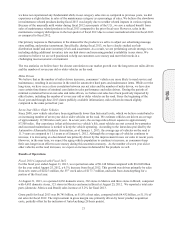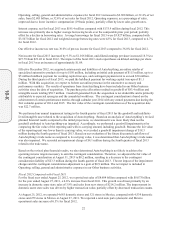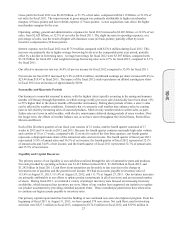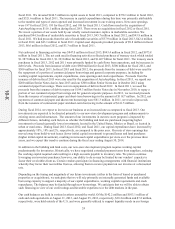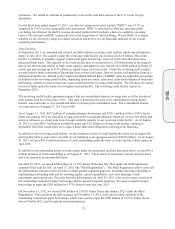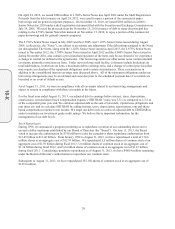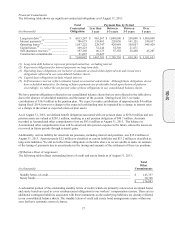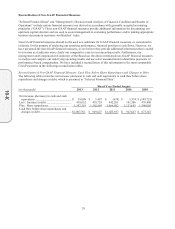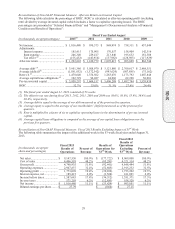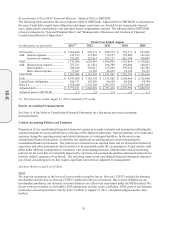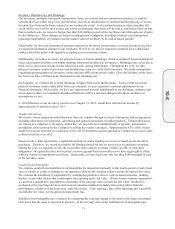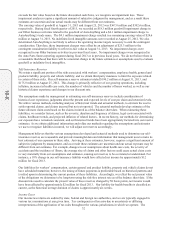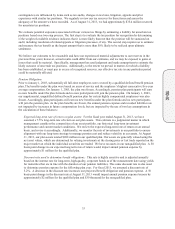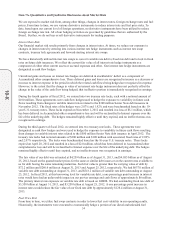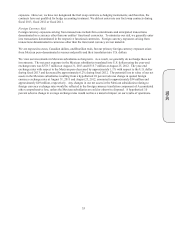AutoZone 2013 Annual Report Download - page 87
Download and view the complete annual report
Please find page 87 of the 2013 AutoZone annual report below. You can navigate through the pages in the report by either clicking on the pages listed below, or by using the keyword search tool below to find specific information within the annual report.
25
operations. We intend to continue to permanently reinvest the cash held outside of the U.S. in our foreign
operations.
For the fiscal year ended August 31, 2013, our after-tax return on invested capital (“ROIC”) was 32.7% as
compared to 33.0% for the comparable prior year period. ROIC is calculated as after-tax operating profit
(excluding rent charges) divided by average invested capital (which includes a factor to capitalize operating
leases). The decrease in ROIC is primarily due to the acquisition of AutoAnything. We use ROIC to evaluate
whether we are effectively using our capital resources and believe it is an important indicator of our overall
operating performance.
Debt Facilities
In September 2011, we amended and restated our $800 million revolving credit facility, which was scheduled to
expire in July 2012. The capacity under the revolving credit facility was increased to $1.0 billion. This credit
facility is available to primarily support commercial paper borrowings, letters of credit and other short-term,
unsecured bank loans. The capacity of the credit facility may be increased to $1.250 billion prior to the maturity
date at our election and subject to bank credit capacity and approval, may include up to $200 million in letters of
credit, and may include up to $175 million in capital leases each fiscal year. Under the revolving credit facility,
we may borrow funds consisting of Eurodollar loans or base rate loans. Interest accrues on Eurodollar loans at a
defined Eurodollar rate, defined as the London InterBank Offered Rate (“LIBOR”) plus the applicable percentage,
as defined in the revolving credit facility, depending upon our senior, unsecured, (non-credit enhanced) long-term
debt rating. Interest accrues on base rate loans as defined in the revolving credit facility. We also have the option
to borrow funds under the terms of a swingline loan subfacility. The revolving credit facility expires in
September 2016.
The revolving credit facility agreement requires that our consolidated interest coverage ratio as of the last day of
each quarter shall be no less than 2.50:1. This ratio is defined as the ratio of (i) consolidated earnings before
interest, taxes and rents to (ii) consolidated interest expense plus consolidated rents. Our consolidated interest
coverage ratio as of August 31, 2013 was 4.68:1.
As of August 31, 2013, $637 million of commercial paper borrowings and $326.3 million of the 6.500% Senior
Notes due January 2014 are classified as long-term in the Consolidated Balance Sheets as we have the ability and
intent to refinance on a long-term basis through available capacity in our revolving credit facility. As of August
31, 2013, we had $963.3 million of availability under our $1.0 billion revolving credit facility, expiring in
September 2016 that would allow us to replace these short-term obligations with long-term financing.
In addition to the revolving credit facility, we also maintain a letter of credit facility that allows us to request the
participating bank to issue letters of credit on our behalf up to an aggregate amount of $100 million. As of August
31, 2013, we have $99.4 million in letters of credit outstanding under the letter of credit facility, which expires in
June 2016.
In addition to the outstanding letters of credit issued under the committed facilities discussed above, we had $41.8
million in letters of credit outstanding as of August 31, 2013. These letters of credit have various maturity dates
and were issued on an uncommitted basis.
On April 29, 2013, we issued $500 million in 3.125% Senior Notes due July 2023 under our shelf registration
statement filed with the SEC on April 17, 2012 (the “Shelf Registration”). The Shelf Registration allows us to sell
an indeterminate amount in debt securities to fund general corporate purposes, including repaying, redeeming or
repurchasing outstanding debt and for working capital, capital expenditures, new store openings, stock
repurchases and acquisitions. Proceeds from the debt issuance on April 29, 2013, were used to repay a portion of
the outstanding commercial paper borrowings and for general corporate purposes. We used commercial paper
borrowings to repay the $200 million in 4.375% Senior Notes due June 2013.
On November 13, 2012, we issued $300 million in 2.875% Senior Notes due January 2023 under the Shelf
Registration. Proceeds from the debt issuance on November 13, 2012, were used to repay a portion of the
outstanding commercial paper borrowings, which were used to repay the $300 million in 5.875% Senior Notes
due in October 2012, and for general corporate purposes.
10-K


